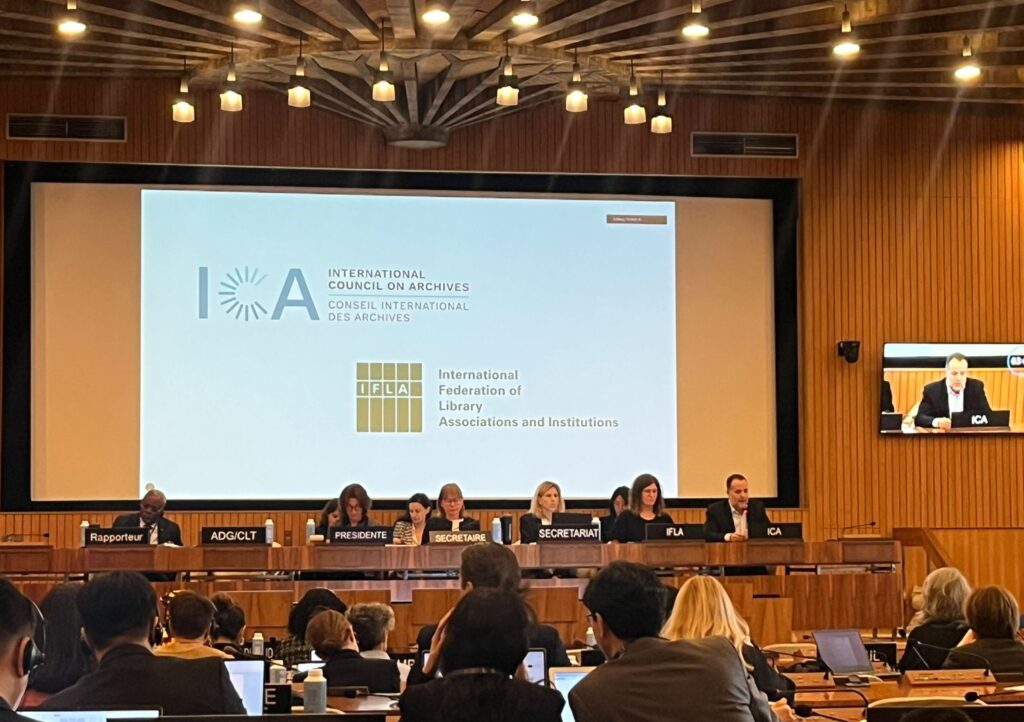IFLA and ICA Highlight Theft and Trafficking of Documentary Heritage at UNESCO
23 May 2025
IFLA took part in a meeting of the Subsidiary Committee of the UNESCO 1970 Convention, which concerns the fight against illicit trafficking of cultural heritage.
We joined our partners from the International Council on Archives (ICA) to highlight documentary heritage, including archives, manuscripts, and rare books. This is timely, as conflicts and instability in certain regions have increased the risk of looting and trafficking of rare and valuable library materials.

Interested in learning more?
Combatting Illicit Trafficking of Documentary Cultural Heritage: An introduction
The 1970 Convention on the Means of Prohibiting and Preventing the Illicit Import, Export and Transfer of Ownership of Cultural Property provides an international framework for the prevention of theft and looting, as well as the return and restitution of stolen cultural property. The common understa...
Below are five key talking points about theft and trafficking of documentary heritage – and some actions IFLA and our experts and volunteers are taking to help.
1. Good documentation and inventories are key
A major ongoing challenge is the lack of documentation and inventories, especially in older or smaller institutions. Having comprehensive records is a critical aspect of tracking losses or potential thefts. This includes documenting identifying features in collections, especially ownership markings and other unique features, markings, and good records of how items have been marked as deaccessioned over the years.
2. We must work together!
We can start by collaborating in the documentary heritage sector! IFLA’s work includes a partnership with the International League of Antiquarian Booksellers, led by our Rare Books and Special Collections Section, as well as with ICA through their Expert Group Against Theft, Trafficking and Tampering (EGATTT) – on which IFLA is represented.
The upcoming EGATTT Guide to Prevent Thefts and Illegal Trafficking of Documentary Heritage, developed with the support of IFLA, the UNESCO Memory of the World Programme, and INTERPOL, will be launched this October at the EGATTT Symposium in Barcelona, Spain.
It’s critical to work beyond the sector as well. The Preservation and Conservation (PAC) Centre hosted at Qatar National Library has been working closely with authorities, museums, and law enforcement across the region through their Himaya project to strengthen cross-sector collaboration. This includes training sessions, public awareness campaigns, and their annual Doha workshop, which brings together experts from various disciplines to discuss best practices in protecting cultural heritage.
3. Books are made for trade! So when it is illegitimate?
Books are especially challenging when it comes to addressing trafficking of cultural heritage. Throughout history, they have been created in multiples and intended for sale – including beyond borders.
Therefore, it may be helpful to start from the point of view that, most likely, trade is legitimate if buyers and sellers can meet specific criteria. This goes back to the previous point on cooperation – encouraging book dealers, antiquarian specialists and auction houses to sign up to ethical and legal codes of practice is important.
Likewise, working to remove the stigma on reporting missing books and cooperating with the book trade to identify missing materials are critical. For more on this, refer to ILAB’s Missing Books Register and some of the cooperation being led by IFLA’s Rare Books and Special Collections Committee.
4. Libraries can help make material available to more people
Especially in a post-colonial context, large amounts of material can be held outside of their country of origin. Even if sales were legal under the system of the day, this raises ethical questions today.
Libraries can have a role in enabling access to materials, for example, through digital unification projects. Technological advances make it possible to bring together collections, giving digital access to citizens and researchers wherever they may be. This also enables enhancements to be made, such as contextualisation and mediation, providing more value for users.
Download IFLA’s Guidelines on Setting up a Digital Unification Project here.
Guidelines for Setting Up a Digital Unification Project (1st Edition)
IFLA has released its guidelines for setting up a digital unification project. These provide a checklist, and recommendations, for libraries in the planning, delivery, and finalisation of projects to provide digital access to collections across distance and borders. Libraries and archives throughout...
5. Are there gaps in legislation?
Documentary heritage is included in international agreements on cultural heritage, including against theft and trafficking. However, many of these agreements are based on definitions of cultural heritage as they are understood in the West. In other parts of the world, the history of printing and publication is very different.
IFLA’s Advisory Committee on Cultural Heritage has launched work to explore how documentary heritage is defined in different countries and cultures, led by voices who have traditionally not been included. This is step towards ensuring that legislation and awareness by law enforcement reflects the local context.
Download the reflections from the CCH’s Workshop on Documentary Heritage Definitions in Southern Africa for more.
Documentary Heritage and the Role of Libraries: A Southern African perspective
This document is the result of the workshop ‘Towards a Common Understanding of Documentary Heritage’, a collaboration between University of Cape Town Library and IFLA’s Advisory Committee on Cultural Heritage, 11-12 February 2025. The workshop formed part of the CCH project to review documenta...
Thank you to our volunteers from the Advisory Committee on Cultural Heritage, Rare Books and Special Collections Section, and our PAC Centre hosted at Qatar National Library for their input and efforts to represent IFLA in addressing this topic.